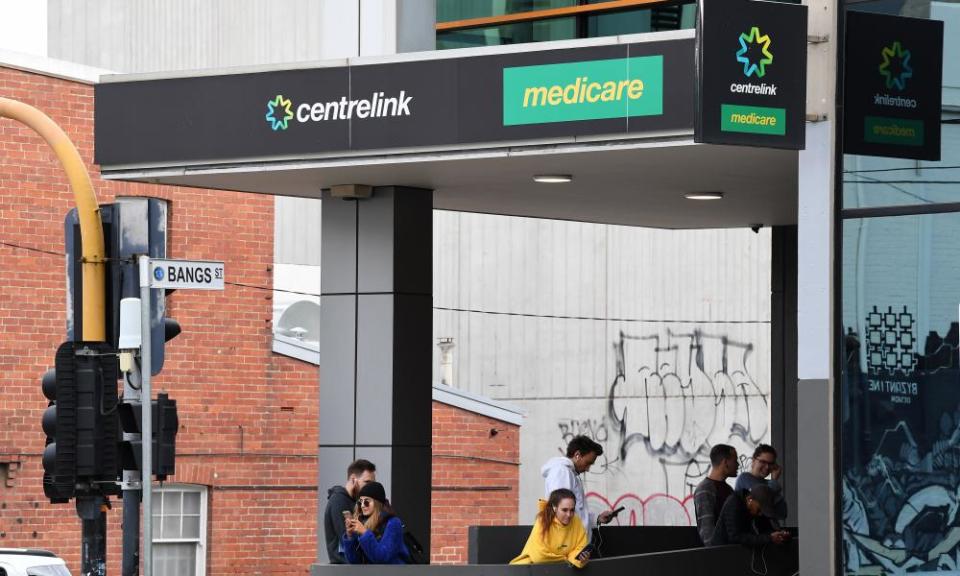No evidence that increased unemployment benefits act as disincentive for job seekers, economists say

There is “no evidence” the coronavirus supplement stopped jobseekers looking for work and even a “substantial increase” in unemployment benefits would not provide a disincentive to take a job.
Those are the conclusions of the labour market economist Jeff Borland presented to a Senate inquiry into extending the supplement to March at the reduced rate of $150 a fortnight.
The evidence, supported by the social policy academic Peter Whiteford, contradicts concerns from Coalition backbench MPs and anecdotal evidence from employers that jobseekers are turning down work.
Scott Morrison has warned temporary economic supports must be pared back to prevent disincentive effects, reasoning that drove the government to cut the supplement from $550 a fortnight from September.
Related: Jobseeker Covid payment extended till March but will be cut to $150 a fortnight
Borland told the Senate community affairs legislation committee that there was “no evidence the higher jobseeker rate in 2020 has had any appreciable effect on incentives to take up paid work”.
Borland found that although the rate of people moving from unemployment to employment froze at the start of the pandemic, as soon as the economy reopened in May “the rate of that flow … returned to its previous level” compared with the preceding three years.
Nor were job vacancies taking longer to fill, which would be expected if jobseeker acted as a disincentive, he said.
Borland said although there was “anecdotal” evidence from some employers, they could be attributing regular difficulty filling positions to the supplement.
“There are always some employers who have difficulty” filling positions, he said, citing employment department data from before the pandemic showing some 45% of employers complained of difficulty filling vacancies despite 20 applicants on average for each job.
Whiteford noted that if jobseeker goes back to its old rate of $40 a day it will be 40% of the minimum wage, providing an “extremely high” incentive to find work.
But even if jobseeker was raised to the rate of the age pension, at 65% of the minimum wage, workers would still be “much, much better off” in full-time work, he said.
In November, Morrison said Australia’s safety net could “potentially” act as an impediment to employment “as we hear from so many employers around the country who are seeking people to go into jobs”.
Related: Covid welfare cut will cast 330,000 more Australians into poverty, analysis shows
In June Guardian Australia revealed claims that jobseekers were turning down work were based on a handful of responses from among 2,324 surveyed employers.
The shadow social services minister, Linda Burney, said the government “continues to contradict the evidence of the experts by cynically insinuating that Australians out of work are choosing unemployment”.
“With 1.8 million Australians expected to be on unemployment by the end of the year, the reality is that there are simply not enough jobs for everyone who needs one.”
The Greens senator Rachel Siewert said it was “outrageous that the government have continued their ideological attacks on people on income support in the face of the worst recession of a generation”.
Despite the government insisting no decision has been made about the future of jobseeker payments, the coronavirus supplement extension bill stipulates that after 31 March the supplement will be repealed.
The bill permanently removes Covid-19 exemptions to the liquid assets test waiting period and the assets test, meaning singles with $5,500 of liquid assets and couples with $11,000 would have to wait up to 13 weeks to get jobseeker.
Earlier in the hearing, the Australian Council of Social Services chief executive, Cassandra Goldie, urged the Senate to oppose the bill on the basis it should instead push for jobseeker to be raised to the rate of the aged pension.
Corey Irlam, the deputy chief executive of the Council of the Ageing, said a return to the old rate of jobseeker would drive older Australians, who face great difficulty re-entering the workforce over the age of 55, further into poverty.
Paul Zahra, the chief executive of the Australian Retailers Association, said the coronavirus supplement had been the “quiet achiever” of the pandemic, helping support an anticipated 2.8% increase in Christmas trade compared with 2019.
Given 58% of jobseeker payments were spent in retail, Zahra said the ARA estimated that the supplement was worth $8.5bn per year to the sector, helping to support 130,000 jobs.

 Yahoo Finance
Yahoo Finance 